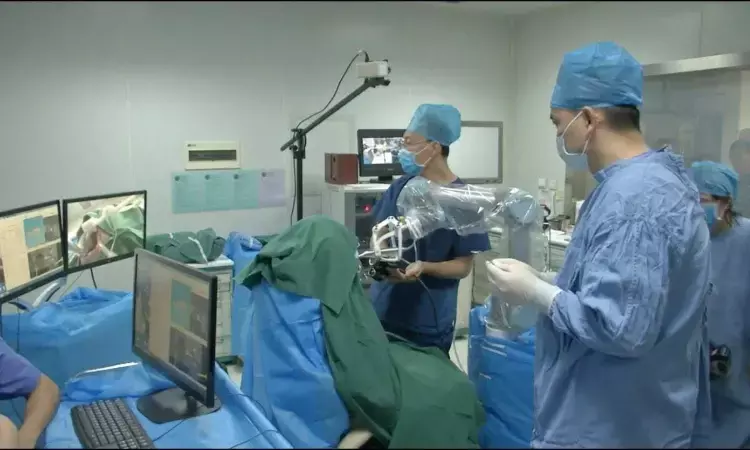- Home
- Medical news & Guidelines
- Anesthesiology
- Cardiology and CTVS
- Critical Care
- Dentistry
- Dermatology
- Diabetes and Endocrinology
- ENT
- Gastroenterology
- Medicine
- Nephrology
- Neurology
- Obstretics-Gynaecology
- Oncology
- Ophthalmology
- Orthopaedics
- Pediatrics-Neonatology
- Psychiatry
- Pulmonology
- Radiology
- Surgery
- Urology
- Laboratory Medicine
- Diet
- Nursing
- Paramedical
- Physiotherapy
- Health news
- Fact Check
- Bone Health Fact Check
- Brain Health Fact Check
- Cancer Related Fact Check
- Child Care Fact Check
- Dental and oral health fact check
- Diabetes and metabolic health fact check
- Diet and Nutrition Fact Check
- Eye and ENT Care Fact Check
- Fitness fact check
- Gut health fact check
- Heart health fact check
- Kidney health fact check
- Medical education fact check
- Men's health fact check
- Respiratory fact check
- Skin and hair care fact check
- Vaccine and Immunization fact check
- Women's health fact check
- AYUSH
- State News
- Andaman and Nicobar Islands
- Andhra Pradesh
- Arunachal Pradesh
- Assam
- Bihar
- Chandigarh
- Chattisgarh
- Dadra and Nagar Haveli
- Daman and Diu
- Delhi
- Goa
- Gujarat
- Haryana
- Himachal Pradesh
- Jammu & Kashmir
- Jharkhand
- Karnataka
- Kerala
- Ladakh
- Lakshadweep
- Madhya Pradesh
- Maharashtra
- Manipur
- Meghalaya
- Mizoram
- Nagaland
- Odisha
- Puducherry
- Punjab
- Rajasthan
- Sikkim
- Tamil Nadu
- Telangana
- Tripura
- Uttar Pradesh
- Uttrakhand
- West Bengal
- Medical Education
- Industry
Autonomous robotic implant surgery system potential alternative in dental implant surgery

An autonomous robotic implant surgery system can be a potential alternative in dental implant surgery suggests a new study published in the Journal of Dentistry.
This study aimed to investigate the accuracy of the autonomous robotic computer-assisted implant surgery (r-CAIS) for single-tooth implant placement.
Results
Ten patients with single dental implant placement were enrolled. No adverse surgical events and postoperative complications (i.e., infection and early implant failure) were reported.
The autonomous robotic implant surgery exhibited a mean overall coronal deviation of 0.74 mm , a mean overall apical deviation of 0.73 mm , and an angular deviation of 1.11° , respectively.
The high accuracy of autonomous r-CAIS technology in single-tooth implant placement was attributed to the control of the angular deviation and axial errors.
The main findings of this study provide significant evidence to support the autonomous robotic implant surgery system as a potential alternative in dental implant surgery.
Reference:
Shuo Yang, Jiahao Chen, An Li, Ke Deng, Ping Li, Shulan Xu, Accuracy of autonomous robotic surgery for single-tooth implant placement: A case series, Journal of Dentistry, Volume 132, 2023,104451,ISSN 0300-5712,https://doi.org/10.1016/j.jdent.2023.104451. (https://www.sciencedirect.com/science/article/pii/S0300571223000386)
Dr. Shravani Dali has completed her BDS from Pravara institute of medical sciences, loni. Following which she extensively worked in the healthcare sector for 2+ years. She has been actively involved in writing blogs in field of health and wellness. Currently she is pursuing her Masters of public health-health administration from Tata institute of social sciences. She can be contacted at editorial@medicaldialogues.in.
Dr Kamal Kant Kohli-MBBS, DTCD- a chest specialist with more than 30 years of practice and a flair for writing clinical articles, Dr Kamal Kant Kohli joined Medical Dialogues as a Chief Editor of Medical News. Besides writing articles, as an editor, he proofreads and verifies all the medical content published on Medical Dialogues including those coming from journals, studies,medical conferences,guidelines etc. Email: drkohli@medicaldialogues.in. Contact no. 011-43720751


